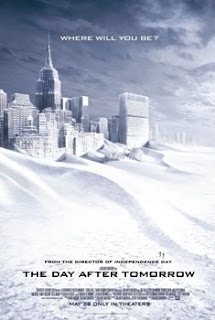 |
| The Day After Tomorrow/Twentieth Century Fox Film Corp. |
New York Governor Cuomo was quoted in the New York Times this Wednesday, saying:
"“Climate change is reality,” while estimating Sandy’s economic damage up to $6 billion. “Given the frequency of these extreme weather situations that we’ve had — and I believe that it’s an increasing frequency — for us to sit here today and say this is a once-in-a-generation and it’s not going to happen again, I think would be shortsighted.”
In that same article, Klaus Jacob, an adviser to New York City on climate change, who had warned of the certainty of flooded Manhattan highways and tunnels of stranded ed subway riders and subway commuters if the next storm surge topped Irene’s, states:
“I’m disappointed that the political process hasn’t recognized that we’re playing Russian roulette,” said Mr. Jacob."
New York Mayor Michael Bloomberg said:
"What’s clear is that the storms that we’ve experienced in the last year or so around this country and around the world are much more severe than before. Whether that’s global warming or what, I don’t know. But we’ll have to address those issues.”
Last but not least, former President Bill Clinton commented as follows:
"I was actually listening closely to what the candidates said in these debates. In the first debate, the triumph of the moderate Mitt Romney. You remember what he did? He ridiculed the president. Ridiculed the president for his efforts to fight global warming in economically beneficial ways. He said, ‘Oh, you’re going to turn back the seas.’ In my part of America, we would like it if someone could’ve done that yesterday. All up and down the East Coast, there are mayors, many of them Republicans, who are being told, ‘You’ve got to move these houses back away from the ocean. You’ve got to lift them up. Climate change is going to raise the water levels on a permanent basis. If you want your town insured, you have to do this.’ In the real world, Barack Obama’s policies work better."
Let's then look at Business Insider's reference to a 2007 report of the OECD that warned that New York, as one of the 20 cities globally that are most exposed to rising sea levels, would by 2070 have $2.1 trillion in assets and nearly 3 million people exposed to major flooding. This report recommends significant investment in flood and storm protection for all coastal cities. By the way, the most at risk city in that report is Calcutta in terms of population exposed (14 million people exposed by 2070) and Miami in terms of assets exposed ($3.5 trillion exposed by 2070.) For followers of this blog also interesting to note two Dutch cities, Amsterdam and Rotterdam are among the top 20 cities exposed in terms of assets.
I know this storm and its consequences are overwhelming to many residents who suffered its wrath. I also realize that adding a discussion at this time about possible causes and climate change is challenging as well. But I do think that this is one, of a few, critical issues facing us all, and that it's time to stop ignoring multiple warnings, just like the government ignored the warnings in The Day After Tomorrow. So, in ending this post I want to add a few more resources about climate change and then ask you to think about what you would like our political representatives to do and what each of us can do now to help this region to recover from the damage caused by hurricane Sandy and equally important to ensure that this doesn't keep happening.
Global Warming Systemically Caused Hurricane Sandy by George Lakoff in RSN. Lakoff explains
the difference between systemic and direct causation. It sounds like semantics, but words count when speaking of global warming.
Hurricane Sandy as Greek Tragedy by Mark Hertsgaard in The Nation.
Nature Votes Last by Timothy Egan in The News York Times, who says:
"Did global warming cause Sandy to be so massive, so destructive, so unfathomable? There's no consensus on this specific storm. But virtually every reputable atmospheric scientist who is not tied by money to an oil or coal company says that this week's storm is a picture of what's to come, if not already here."
Is Global Warming to Blame for Superstorm? Scientists Weigh In, in Insurance Journal
There is so much to read but here four books with each a different angle to climate change:
Climate Change 2007: The Physical Science Basis This is the physical science basic issued by the UN Intergovernmental Panel on Climate Change (IPCC) which confirms that our scientific understanding of the climate system and its sensitivity to greenhouse gas emissions is now richer and deeper than ever before.
The Carbon Crunch: How We're Getting Climate Change Wrong--and How to Fix It by Dieter Helm. This book focuses on the economics of renewable energy, and comes to some practical conclusions, which may not always be popular with green activists.
The Tierra Solution: Resolving Climate Change Through Monetary Transformation by Frans Verhagen. The author takes a holistic approach and tackles three curent problems at once: climate change, the financial crisis and the global monetary system. Not always easy to grasp, but chock full of new ideas.
Earth Fever: Living Consciously with Climate Change by two Dutch authors, Erik van Praag and Jan Paul van Soest, and one Canadian, Judy McAllister. This book interviews international thought and spiritual leaders, oil and bank executives, and challenges its readers to a new way of thinking in dealing with climate change and creating a better future.




No comments:
Post a Comment